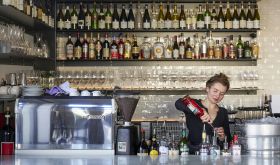The world's only seven-star hotel
Sunday 11 January 2004
• 6 min read
The following is an article I wrote for the Financial Times based on a brief four-day stay in Dubai in October 2003 when I was asked to go and present a couple of wine events there. For the moment there is no reason for wine lovers to make a special detour to Dubai. While there is no sign of the sort of restrictions (on anything) that one might expect from a Muslim country, wine imports are heavily taxed and in the hands chiefly of just two companies, never a recipe for a fantastic selection. I would not be at all surprised, however, if the energetic Crown Prince (see below) did not step quietly on to the fine wine bandwagon in the way that those running Las Vegas have done. For the moment though it is difficult to talk too loudly about wine. The food and beverage manage of the Burj al Arab was invited on to a Dubai radio station to talk about my forthcoming visit but the interview had to be conducted without his ever mentioning the W-word. Tricky.
I was very impressed by the facilities at the Jumeirah international hotel school (allied with Lausanne, no less) just across the causeway from the Burj, where I had to give a little talk on wine to the truly multicultural students. My confidence faltered a little however when I started my talk by telling them story of the journalist in Shanghai who asked me "Tell me, Mrs Robinson, what, in your experience, is the difference between red and white wine?" Complete silence rather than the usual laugh greeted this. And then a hand went up and I was asked "so what IS the difference then?"
"Great," said our 12 year old daughter when told we might take her to Dubai for the October half-term break, "no culture!"
Dubai certainly contrasted vividly with its October destination predecessors Paris, Florence and the American South. Quite what Haussmann, Michelangelo and Jefferson would make of the gold tap capital of the world is not difficult to guess. Even we were unprepared for the potent cocktail of luxury and vulgarity offered by Dubai. Arriving, like most visiting Europeans, jetlagged off a plane from London early in the morning, we were driven to the Burj Al Arab ('the world's only seven star hotel') in – what else? – a white Rolls Royce.
At the hotel itself, 27 floors moulded into the emirate's trademark image (on all Dubai car licence plates), a spinnaker-shaped sky-scraper rising straight out of the Arabian Gulf, we felt positively assaulted by its unleavened gold and marble, its multi-coloured fountains, its insistently slavish service.
There was something just so ridiculously over the top about our two-floor suite with its two giant reception rooms and a kitchen that I did not discover until the last of the four days we spent there. The electronics that governed such usually simple operations as drawing the vast bedrooms' curtains or letting someone (someone in this case being our very own butler in tails) into the room seemed absurdly complicated to us. And did we really need two personal computers to call our own, one of them portable and both with permanent online access?
There is no need for a front desk at 'the Burj' since every floor has its own concierge, ready to signal to the invisible room staff that they may enter and roll yet more bales of freshly pressed linen on to our sheikh-sized beds.
The decor is very definitely more sheikh than duke. Brilliant red, yellow and blue is the colour scheme. Gold is the trim of choice. The guests in this icon hotel are an unusual social mix of well-heeled and mostly male Arabs; northern Europeans in search of sun, sea and shopping; and even whiter Russians in groups typically made up of a pudgy oligarch on his cellphone, one glamorous wife, a clutch of children and at least one bodyguard. To my knowledge the hotel has no special modifications for the Russians, but in each luxuriously carpeted dressing room is an arrow towards Mecca and a laundry list priced for such items as a dishdash.
One of the challenges for the designer of any Dubai hotel of quality must be to work out how the skimpily dressed Europeans on their way back from the beach can be ferried to their rooms without offending the natives. It took some time to work out that the Burj Al Arab likes its guests to commute straight between the pool at the back of the hotel and the super- luxurious, Arabian Nights-like spa at the top of the hotel by discreet lifts. The quite extraordinary foyer at the front of the hotel with its aquabatic fountains and jewelry displays is really designed not for the hotel's guests but for the visitors who are allowed in, at strictly controlled times, to gawp and take photographs.
All of this vulgarity is of course very much easier to take if one really is a guest, that is invited to stay there to host some wine dinners in my case, rather than being cowed by the knowledge that every little foray to the multicultural breakfast buffet (camel milk rice pudding a speciality) will eventually find its way on to your final bill.
Bruised by long years of half term breaks spent trudging round foreign museums, art galleries and churches, our daughter had been looking forward to mingling with English-speaking contemporaries who love water parks (Wild Wadi claims to be the world's most innovative water park) and Shirley Temples (lemonade and grenadine cocktails) as much as she does. She was not disappointed. Through her we discovered a British family with three young children who have been coming to the Burj two or three times a year for as long as they can remember. He works in the City of London of course. And their girls were completely at home whizzing about in the hotel buggies between the Burj's pool, its nearby sister hotels and its quite stunning sandy private beach constructed at who knows how much ecological cost.
(Dubai's energetic Crown Prince has kept the country afloat by dint of the most breathtakingly ambitious schemes to boost tourism, including the new Palm Jumeirah development being built on top of the sea to look like a palm tree from space and provide holiday palaces for Europe's top footballers and a giant new shopping mall, The Mall of Arabia, and the Dubailand leisure experience which will house such unlikely attractions as a dry ski slope. His constant reconstruction of the emirate has attracted criticism from environmental campaigners however.)
The Jumeirah Beach Club, a quiff-shaped hotel just across the Burj's causeway on the mainland, looked much noisier and more family-orientated than the Burj, but has a nest of private villas just next to Wild Wadi for the most cosseted children. The Jumeirah group is also busy building another vast hotel just next to the Burj's beach. Currently under construction (Dubai hosts thousands of immigrant workers, notably from the subcontinent and used to working in 40 degree heat), the hotel has already opened its doors and filled a large pool between it and the beach with ornamental dhows in which guests may float for their amusement. The bar was doing brisk multicultural business, one white-robed businessman next to us seeming to know considerably more about various brands of vodka than his South African waitress.
I had heard that Dubai is a dream for shoppers but, I felt, only shoppers in search either of bright yellow gold jewelry or the well-known international fashion brands. On our one visit in to town and the various souks (more Oxford Street than Marrakech), we were most interested in the wholesale spice merchants with their sacks of saffron, and in an old townhouse preserved as a museum with its substantial courtyard and separate quarters for men and women.
What I enjoyed most about the trip was the really excellent standard of food (one eats in hotels in Dubai) and that beautiful beach which had waves at the perfect temperature and height for me. (This is surely one thing that remains outside the control of the Crown Prince; the sea is said to be uncomfortably hot for most of the summer.)
Dubai's ex-pats seem hardly able to believe their luck to be wallowing in such high comfort and low taxes. The great majority of the country's population are foreigners who do practically all of the work and come from an extraordinarily wide range of countries.
But this is not a destination for those with highly developed aesthetic or egalitarian sensibilities. I kept thinking of hundreds of friends and family who would hate Dubai with a passion. But I am ashamed to admit that I positively lapped it up for four days and had become completely acclimatised within less than 24 hours. In fact by the time our departure day dawned, we were positively affronted by the fact that breakfast in our suite was seven minutes late and it took the bellhop at least five minutes to arrive in our room.
But as I looked out of the stately Rolls at Dubai city on the way to the airport, I could not help thinking what a very strange place it is. Rose cannot wait to go back, of course, but first she has to do penance in a few more museums.
Become a member to continue reading
Member
$135
/year
Ideal for wine enthusiasts
- Access 288,055 wine reviews & 15,863 articles
- Access The Oxford Companion to Wine & The World Atlas of Wine
Inner Circle
$249
/year
Ideal for collectors
- Access 288,055 wine reviews & 15,863 articles
- Access The Oxford Companion to Wine & The World Atlas of Wine
- Early access to the latest wine reviews & articles, 48 hours in advance
Professional
$299
/year
For individual wine professionals
- Access 288,055 wine reviews & 15,863 articles
- Access The Oxford Companion to Wine & The World Atlas of Wine
- Early access to the latest wine reviews & articles, 48 hours in advance
- Commercial use of up to 25 wine reviews & scores for marketing
Business
$399
/year
For companies in the wine trade
- Access 288,055 wine reviews & 15,863 articles
- Access The Oxford Companion to Wine & The World Atlas of Wine
- Early access to the latest wine reviews & articles, 48 hours in advance
- Commercial use of up to 250 wine reviews & scores for marketing
More Travel tips

Travel tips
A plea to get out in the vines this autumn – with tips on how and where to go. Above...

Travel tips
Spring is the perfect time to check out this thriving East Coast wine region, according to Virginia native Sedale McCall...

Travel tips
Wine writer, anthropologist and surfer Chris Howard is seduced by wines made where the Loire meets the ocean. Above, an...

Travel tips
A guide to drinking (and eating) well in the capital of Victoria (image © Carlton Wine Room).
Melbourne has more...
More from JancisRobinson.com

Inside information
Turning tides have brought wine back to the edges of north-west France, says Paris-based journalist Chris Howard. This is part...

Tasting articles
Part 2 of Walter’s in-depth look at the new generation of producers reviving Marsala’s reputation. Above, Nino Barraco, one of...

Inside information
Perpetuo, Ambrato, Altogrado – these ancient styles offer Marsala a way to reclaim its identity as one of Sicily’s vinous...

Free for all
Everything we’ve published on this challenging vintage. Find all our published wine reviews here. Above, the town of Meursault in...

Nick on restaurants
Three more reasons to head to this charming city in southern Spain.
As we left Confitería La Campana, which first...

Wine news in 5
Plus, Telmont becomes Champagne’s first Regenerative Organic Certified producer, Argentina repeals wine regulations and the EU rules on de-alcoholised wine...

Free for all
But how long will Madeira, one of the great fortified wines, survive tourist development on this extraordinary Atlantic island? A...

Wines of the week
A perfectly ordinary extraordinary wine. From €19.60, £28.33, $19.99 (direct from the US importer, K&L Wines).
A few months ago...
